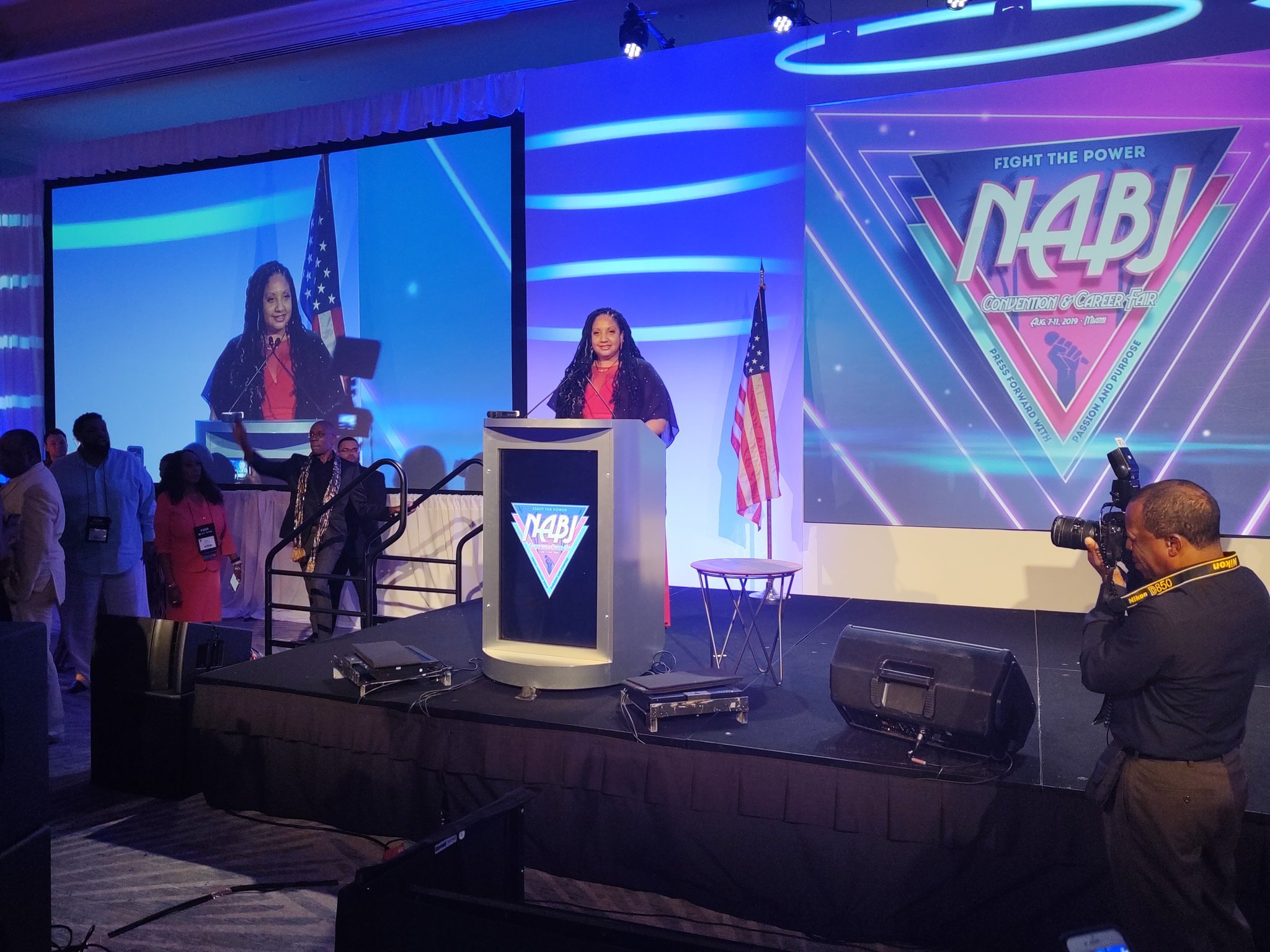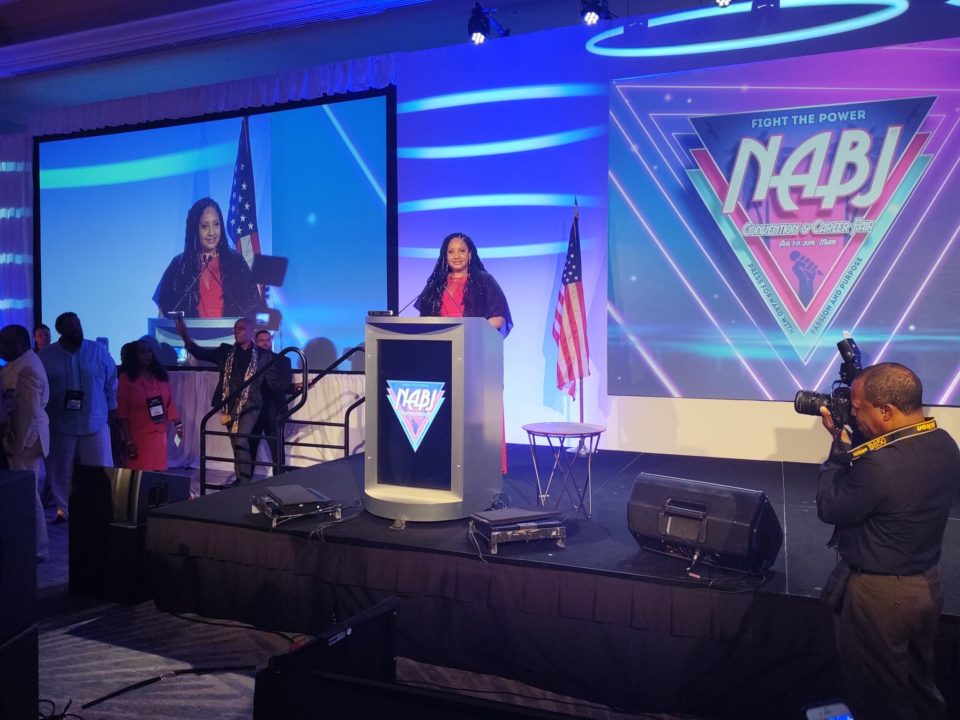More Than 4,000 Flock to Miami
- NABJ’s Tucker ‘Out Hustled’ Competitors (new web page)
- Metro Seven Join NABJ Hall of Fame (new web page)

More Than 4,000 Flock to Miami
By Wayne Dawkins
The youth movement was evident at the annual National Association of Black Journalists convention in Aventura, Fla., near Miami, last week. Three of every four attendees were 20- to 30-
something millennials or 40ish Gen Xers, announced the organizers. The attendance record was not exceeded; it was demolished: the final figure was 4,129 attendees, said Executive Director Drew Berry, breaking the 3,340 mark at Atlanta-2005. [The previous record was 3,300 in Chicago, 1997].
A most-discussed theme during the four-day gathering was race and the 2020 U.S. presidential election. Thursday morning, Abby Phillip of CNN moderated the first of a three-part, two-hour opening plenary session.
Astead W. Herndon of the New York Times, Eva McKend, who covers the Kentucky congressional delegation in Washington for Spectrum Networks, and Darlene Superville of the Associated Press struggled with questions about doing a better job of covering race now that it is intertwined with politics because of Trump.
We’ve reached a point, said Phillip, where journalists are covering white identity politics, not just the conventional effort to include African American and Latinx voices in mainstream narratives.
“I don’t know if we’re there,” answered Herndon, regarding whether coverage is better. “Whites are coming to the ballot box with a racial lens. When President [Trump] is targeting minorities, his base is enjoying it.” Herndon added, “We’ve been pushed to look at race in a fact-driven, clear-eyed way. Donald Trump has shocked newsrooms into looking at this.”
McKend said, “Trump’s base likes the demonization. They think white supremacy is a myth.”
Superville said the lethal mass shootings the weekend before the convention that targeted people of color released an unpredictable commander in chief: “Trump is forced to come out and be somewhat presidential, then after a few days later, he’s back on Twitter insulting people.”
The shootings in El Paso, Texas, and Dayton, Ohio, that left several dozen dead prompted calls from Democratic presidential candidates and others to regulate civilian use of military-style weapons, McKend noted.
They also initiated a dance between Trump and Senate Majority Leader Mitch McConnell, R-Ky., Said McKend: “He’s moving where the president is moving on guns.”
McKend, who tracks McConnell, was the correspondent who asked his opinion about reparations for blacks in advance of congressional hearings last month. “I think people I work with appreciated that I asked,” she said in response to a question.
A good recognition of the above, said Superville, is that Errin Haines Whack, the Associated Press’ lead reporter on race and ethnicity, is covering presidential politics.
Since the midterms, Whack’s priority has been the intersection of race and politics. She is focused on themes of race in the 2020 election through next November. Politico wrote about her role here.
Attendance for this session peaked at 120 in the 720-person capacity ballroom.

At the Friday business meeting, Berry noted that despite overwhelming record attendance, conferees were still arriving, and the numbers were expected to grow when the final tally was done after noontime, Saturday. Last year’s Detroit convention attracted 3,010 attendees, he said.
Significant funding was still pouring in, said Berry, and, there were significant added expenses.
For starters, police presence — federal, state and local — was increased at the convention site in response to the El Paso and Dayton incidents. Berry said there was extra spending for complimentary food and beverages for attendees, and he persuaded the JW Turnberry Miami to double the bandwidth because of anticipated super-use by journalists.
NABJ stress-tested the hotel resort. Previously, the largest number of attendees at Turnberry was 1,500, said Berry. [On Friday evening, internet and cell phone service was sluggish during a tropical downpour.] NABJ had a surplus budget of $102,000 for the extra costs, said Berry, but he anticipated about $200,000 in extra expenses.
The two-hour business meeting attended by about 50 people was noteworthy for punctuality and civility compared to previous extended, raucous meetings. Lots of good news was reported. In addition to record attendance, 2019 was another revenue surplus year. Finance Chair Gregory Lee Jr. said this was the fourth consecutive year of surpluses.
Yet the meeting was not all sweetness and light. Discussion became chippy during the Constitution and Bylaws segment. Chair Melanie Burney was asked about the uproar over a constitutional amendment that proposed reduction of board members that included eliminating the academic representative.
Burney said members were notified appropriately, at least 60 days in advance, and e-blasts were sent. The academic representative and the constituents, however, could not vote on the amendment. “So how can educators be heard?” asked E.R. Shipp, associate professor at Morgan State University. President Sarah Glover answered that educator members were interspersed in the Innovation Bubble program planning, i.e. “Breaking into Audio and Podcasting,” or “Getting Started with WordPress. ” These were sponsored workshops.
Wayne Dawkins, associate professor at Morgan State, stated for the record that in the future longtime journalists who transition to academia should retain their $100 full-voting memberships and not downgrade to the $80 academic [or media-related] category. Milt Brown, Ph.D, the academic representative, answered, “I am a representative without a country, an ambassador without portfolio. I was a professor of practice who took the $20 drop. I urge a ‘no’ vote on the amendment.”
The amendment did fail narrowly Friday evening, short of the two-thirds majority needed. As of July 16, said Berry, the NABJ symbol that includes a pen and microphone embedded in the italicized letters, is now trademarked. People other than NABJ members and staff will be required to pay licensing fees for use of the symbol.
Congratulations to @wendi_c_thomas @deadlinedd @MLK50Memphis for winning @NABJ‘s Best Practices Award #NABJ19 @WKRG pic.twitter.com/TSdttHctCh
— NABJ Headquarters (@NABJ) August 11, 2019
News events were felt at the convention. The Thursday plenary opened with a moment of silence in memory of Toni Morrison, 88, Pulitzer- and Nobel Prize-winning author, who died Aug. 5.
On Saturday morning, David Peterkin, an ABC News executive, interrupted the annual Columbia J-school breakfast to announce that reputed child sex predator Jeffrey Epstein died in a New York prison from a suspected suicide.
Wayne Dawkins is an associate professor at Morgan State University’s School of Global Journalism and Communication and author of “Black Journalists: The NABJ Story” and “Rugged Waters: Black Journalists Swim the Mainstream.”
- Sara Atske, Michael Barthel, Galen Stocking and Christine Tamir, Pew Research Center: 7 facts about black Americans and the news media (Aug. 7)
- Michael Calderone, Politico: Black journalists push media to cover ‘hyper-racial’ moment in politics (July 29)
- Luther Campbell, Miami New Times: National Association of Black Journalists Should Help Create African-American News Network (Aug. 7)
- Saahil Desai, the Atlantic: Pete Buttigieg: Racism Isn’t Something That ‘Happened a Long Time Ago’
- Melanie Eversley, Fortune: 2020 Candidates Focus on Criminal Justice, White Supremacy at Forum Before Black Journalists Convention
- Elaijah Gibbs-Jones, NABJ Monitor: NABJ, NAHJ bet on joint convention in Las Vegas in 2022
- Elaijah Gibbs-Jones, NABJ Monitor: Presidential candidate forum looks to ease racial divide
- Elaijah Gibbs-Jones, NABJ Monitor: Literary giant Toni Morrison’s legacy celebrated in annual authors showcase (Aug. 7)
- Rebecca Klar, the Hill: Booker tells National Association of Black Journalists: ‘We need your voices’
- National Association of Black Journalists: NABJ Elects Dorothy Tucker as the 22nd President to Lead the Association
- National Association of Black Journalists: NABJ Announces Salute to Excellence Winners
- National Association of Black Journalists: The Truths that President Trump Must Consider: From Racism to Baltimore (July 31)
- National Association of Black Journalists: NABJ Names Convention Co-Chair Eva Coleman Journalism Educator of the Year (July 31)
- National Association of Black Journalists: Xavier’s Allana J. Barefield Named 2019 Student Journalist of the Year (July 29)
- National Association of Black Journalists: NABJ President on Use of the Terms Race and Racist (July 29)
- Adama Makasuba, the Voice, Gambia: Pap Saine says he was under security threat during the impasse (July 19) (Pap Saine is NABJ’s Percy Qoboza Foreign Journalist of the Year)
- Jessica Taylor, NABJ Monitor: NABJ foresees surplus for fifth consecutive year
- Jessica Taylor & Jerell Rushin, NABJ Monitor: Dorothy Tucker cruises to victory over Lee, Walker
- Jessica Taylor & Elaijah Gibbs-Jones, NABJ Monitor: Lack of leadership pipeline, proposed amendments dominate business meeting
- Joseph P. Williams, U.S. News & World Report: Bernie Sanders Turns On the Charm at Conference of Black Journalists
Support Journal-isms
When you shop @AmazonSmile, Amazon will make a donation to Journal-Isms Inc. https://t.co/OFkE3Gu0eK
— Richard Prince (@princeeditor) March 16, 2018
Facebook users: “Like” “Richard Prince’s Journal-isms” on Facebook.
Follow Richard Prince on Twitter @princeeditor
View previous columns (after Feb. 13, 2016).
- Diversity’s Greatest Hits, 2018 (Jan. 4, 2019)
- Book Notes: Is Taking a Knee Really All That? (Dec. 20, 2018)
- Book Notes: Challenging ’45’ and Proudly Telling the Story (Dec. 18, 2018)
- Book Notes: Get Down With the Legends! (Dec. 11, 2018)
- Journalist Richard Prince w/Joe Madison (Sirius XM, April 18, 2018) (podcast)
- Richard Prince (journalist) (Wikipedia entry)
- February 2018 Podcast: Richard “Dick” Prince on the need for newsroom diversity (Gabriel Greschler, Student Press Law Center, Feb. 26, 2018)
- Diversity’s Greatest Hits, 2017 — Where Will They Take Us in the Year Ahead?
- Book Notes: Best Sellers, Uncovered Treasures, Overlooked History (Dec. 19, 2017)
- An advocate for diversity in the media is still pressing for representation, (Courtland Milloy, Washington Post, Nov. 28, 2017)
- Morgan Global Journalism Review: Journal-isms Journeys On (Aug. 31, 2017)
- Diversity’s Greatest Hits, 2016
- Book Notes: 16 Writers Dish About ‘Chelle,’ the First Lady
- Book Notes: From Coretta to Barack, and in Search of the Godfather
- Journal-isms’ Richard Prince Wants Your Ideas (FishbowlDC, Feb. 26, 2016)
- “JOURNAL-ISMS” IS LATEST TO BEAR BRUNT OF INDUSTRY’S ECONOMIC WOES (Feb. 19, 2016)
- Richard Prince with Charlayne Hunter-Gault,“PBS NewsHour,” “What stagnant diversity means for America’s newsrooms” (Dec. 15, 2015)
- Book Notes: Journalists Follow Their Passions
- Book Notes: Journalists Who Rocked Their World
- Book Notes: Hands Up! Read This!
- Book Notes: New Cosby Bio Looks Like a Best-Seller
- Journo-diversity advocate turns attention to Ezra Klein project (Erik Wemple, Washington Post, March 5, 2014)
Columns below from the Maynard Institute are not currently available but are scheduled to be restored soon on journal-isms.com.
- Book Notes: “Love, Peace and Soul!” And More
- Book Notes: Book Notes: Soothing the Senses, Shocking the Conscience
- Diversity’s Greatest Hits, 2015
- Diversity’s Greatest Hits, 2014
- Diversity’s Greatest Hits, 2013
- Diversity’s Greatest Hits, 2012
- Diversity’s Greatest Hits, 2011
- Diversity’s Greatest Hits, 2010
- Diversity’s Greatest Hits, 2009
- Diversity’s Greatest Hits, 2008
- Book Notes: Books to Ring In the New Year
- Book Notes: In-Your-Face Holiday Reads
- Fishbowl Interview With the Fresh Prince of D.C. (Oct. 26, 2012)
- NABJ to Honor Columnist Richard Prince With Ida B. Wells Award (Oct. 11, 2012)
- So What Do You Do, Richard Prince, Columnist for the Maynard Institute? (Richard Horgan, FishbowlLA, Aug. 22, 2012)
- Book Notes: Who Am I? What’s Race Got to Do With It?: Journalists Explore Identity
- Book Notes: Catching Up With Books for the Fall
- Richard Prince Helps Journalists Set High Bar (Jackie Jones, BlackAmericaWeb.com, 2011)
- Book Notes: 10 Ways to Turn Pages This Summer
- Book Notes: 7 for Serious Spring Reading
- Book Notes: 7 Candidates for the Journalist’s Library
- Book Notes: 9 That Add Heft to the Bookshelf
- Five Minutes With Richard Prince (Newspaper Association of America, 2005)
- ‘Journal-isms’ That Engage and Inform Diverse Audiences (Q&A with Mallary Jean Tenore, Poynter Institute, 2008)Chrissie Gale, Jennifer Davidson and Nigel Cantwell, the Conversation: Child migrants around the world are being denied their human rights
.

